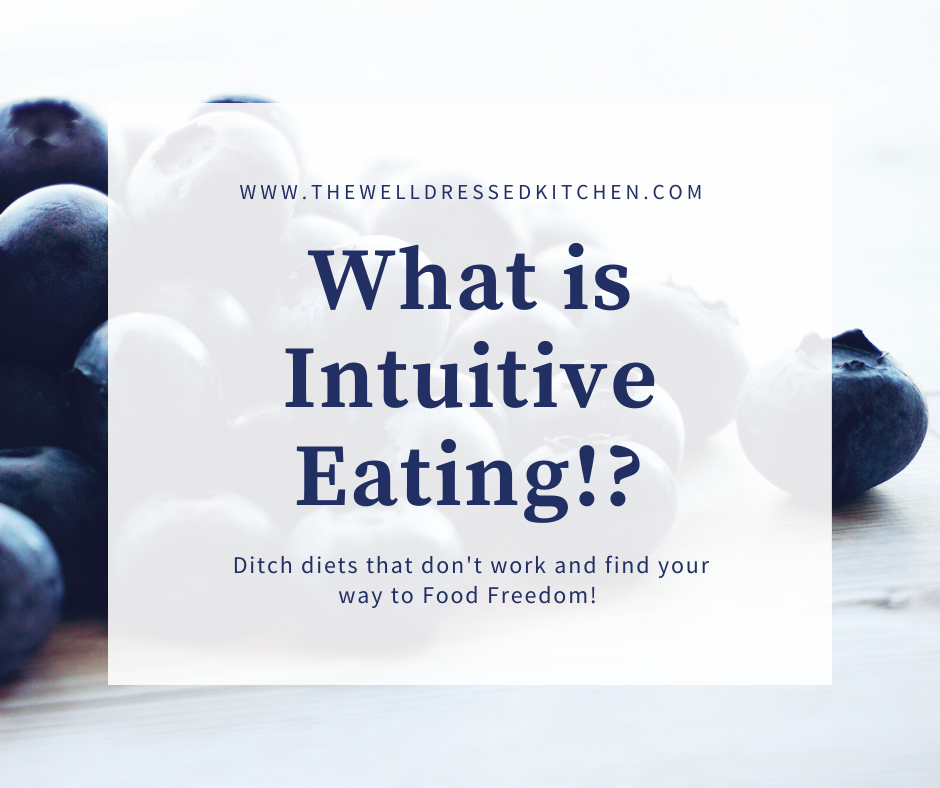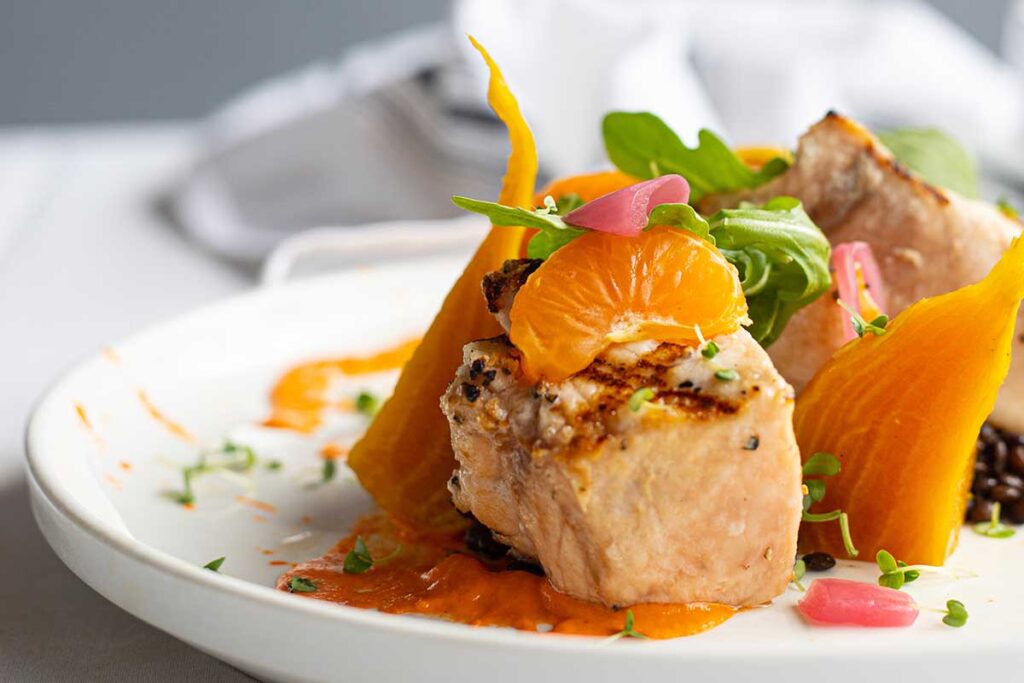Intuitive eating is an approach to health and food that has nothing to do with diets, meal plans, discipline or willpower. It teaches you how to get in touch with your body cues like hunger, fullness and satisfaction while learning to trust your body around food again. Here’s an overview of intuitive eating including the science behind it and the ten principles of intuitive eating.


Intuitive eating is an approach that was created by two registered dietitians, Evelyn Tribole and Elyse Resch. Intuitive eating is a non-diet approach to health and wellness that helps you tune into your body signals, break the cycle of chronic dieting and heal your relationship with food. From my perspective it’s a strategy that helps us break the restrictive or rule focused mindset.
We are all born intuitive eaters, eating when we are hungry and stopping when we are full. As we grow older and rules and restrictions are set around food, we begin to lose our inner intuitive eater. We use food as a reward, we are told certain foods are good for us and others are bad – causing us to feel good about ourselves when we eat “good” foods and guilty when we eat “bad” foods.
Intuitive Eating is not a diet. In fact, it’s exactly the opposite. Instead, it’s bout re-learning to eat outside of the diet mentality. There’s no counting calories or macros and no making certain foods off limits. It’s not about following a meal plan or measuring out your portions. It focuses on putting the focus on your internal cues (aka your intuition) like hunger, fullness and satisfaction, and moving away from external cues like food rules and restrictions.
Intuitive eaters give themselves unconditional permission to eat what they want without feeling guilty. They rely on their internal hunger and satiety signals and trust their body to tell them when, what and how much to eat. They know when they want to at eat veggies and also when they feel like having dessert (and don’t feel guilty or have any regrets with either choice).
The 10 Principles of Intuitive Eating
Intuitive Eating is made up of ten core principles.
1. Reject the Diet Mentality
Throw out the diet books and magazine articles that offer you the false hope of losing weight quickly, easily, and permanently. Get angry at diet culture that promotes weight loss and the lies that have led you to feel as if you were a failure every time a new diet stopped working and you gained back all of the weight. If you allow even one small hope to linger that a new and better diet or food plan might be lurking around the corner, it will prevent you from being free to rediscover Intuitive Eating.
2. Honor Your Hunger
Keep your body biologically fed with adequate energy and carbohydrates. Otherwise you can trigger a primal drive to overeat. Once you reach the moment of excessive hunger, all intentions of moderate, conscious eating are fleeting and irrelevant. Learning to honor this first biological signal sets the stage for rebuilding trust in yourself and in food.
3. Make Peace with Food
Call a truce; stop the food fight! Give yourself unconditional permission to eat. If you tell yourself that you can’t or shouldn’t have a particular food, it can lead to intense feelings of deprivation that build into uncontrollable cravings and, often, bingeing. When you finally “give in” to your forbidden foods, eating will be experienced with such intensity it usually results in Last Supper overeating and overwhelming guilt.
4. Challenge the Food Police
Scream a loud no to thoughts in your head that declare you’re “good” for eating minimal calories or “bad” because you ate a piece of chocolate cake. The food police monitor the unreasonable rules that diet culture has created. The police station is housed deep in your psyche, and its loudspeaker shouts negative barbs, hopeless phrases, and guilt-provoking indictments. Chasing the food police away is a critical step in returning to Intuitive Eating.
5. Discover the Satisfaction Factor
The Japanese have the wisdom to keep pleasure as one of their goals of healthy living. In our compulsion to comply with diet culture, we often overlook one of the most basic gifts of existence—the pleasure and satisfaction that can be found in the eating experience. When you eat what you really want, in an environment that is inviting, the pleasure you derive will be a powerful force in helping you feel satisfied and content. By providing this experience for yourself, you will find that it takes just the right amount of food for you to decide you’ve had “enough.”
6. Feel Your Fullness
In order to honor your fullness, you need to trust that you will give yourself the foods that you desire. Listen for the body signals that tell you that you are no longer hungry. Observe the signs that show that you’re comfortably full. Pause in the middle of eating and ask yourself how the food tastes, and what your current hunger level is.
7. Cope with Your Emotions with Kindness
First, recognize that food restriction, both physically and mentally, can, in and of itself, trigger loss of control, which can feel like emotional eating. Find kind ways to comfort, nurture, distract, and resolve your issues. Anxiety, loneliness, boredom, and anger are emotions we all experience throughout life. Each has its own trigger, and each has its own appeasement. Food won’t fix any of these feelings. It may comfort for the short term, distract from the pain, or even numb you. But food won’t solve the problem. If anything, eating for an emotional hunger may only make you feel worse in the long run. You’ll ultimately have to deal with the source of the emotion.
8. Respect Your Body
Accept your genetic blueprint. Just as a person with a shoe size of eight would not expect to realistically squeeze into a size six, it is equally futile (and uncomfortable) to have a similar expectation about body size. But mostly, respect your body so you can feel better about who you are. It’s hard to reject the diet mentality if you are unrealistic and overly critical of your body size or shape. All bodies deserve dignity.
9. Movement—Feel the Difference
Forget militant exercise. Just get active and feel the difference. Shift your focus to how it feels to move your body, rather than the calorie-burning effect of exercise. If you focus on how you feel from working out, such as energized, it can make the difference between rolling out of bed for a brisk morning walk or hitting the snooze alarm.
10. Honor Your Health—Gentle Nutrition
Make food choices that honor your health and taste buds while making you feel good. Remember that you don’t have to eat perfectly to be healthy. You will not suddenly get a nutrient deficiency or become unhealthy, from one snack, one meal, or one day of eating. It’s what you eat consistently over time that matters. Progress, not perfection, is what counts.
The Science Behind Intuitive Eating
There are now over 100 research studies that have shown the benefits of intuitive eating. The studies show that intuitive eating is associated with:
-
-
- Higher self-esteem
- Better body image
- More satisfaction with life
- Optimism and well-being
- Proactive coping skills
- Lower body mass indexes
- Higher HDL cholesterol levels
- Lower Triglyceride levels
- Lower rates of emotional eating
- Lower rates of disordered eating
-
If you want to learn more about Intuitive Eating and start your journey to Food Freedom I am here to help! To set up a FREE consultation email me at Becca@thewelldressedkitchen or private message me on IG @thewelldressedkitchen.
More Resources for you to enjoy!
Blog Post: Find Clarity and Change Your Life – The Power of Intention
Recipe: No-Bake Peanut Butter Energy Bites – I am obsessed with these No-Bake Energy Bites. They are easy to make and the best part is they taste like cookies. I am not kidding, you have to try these!

